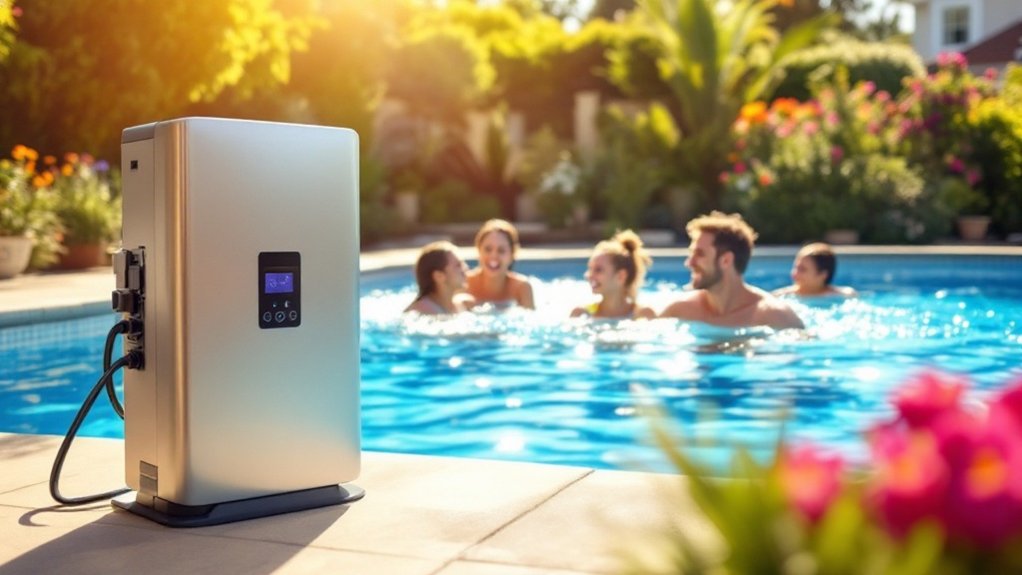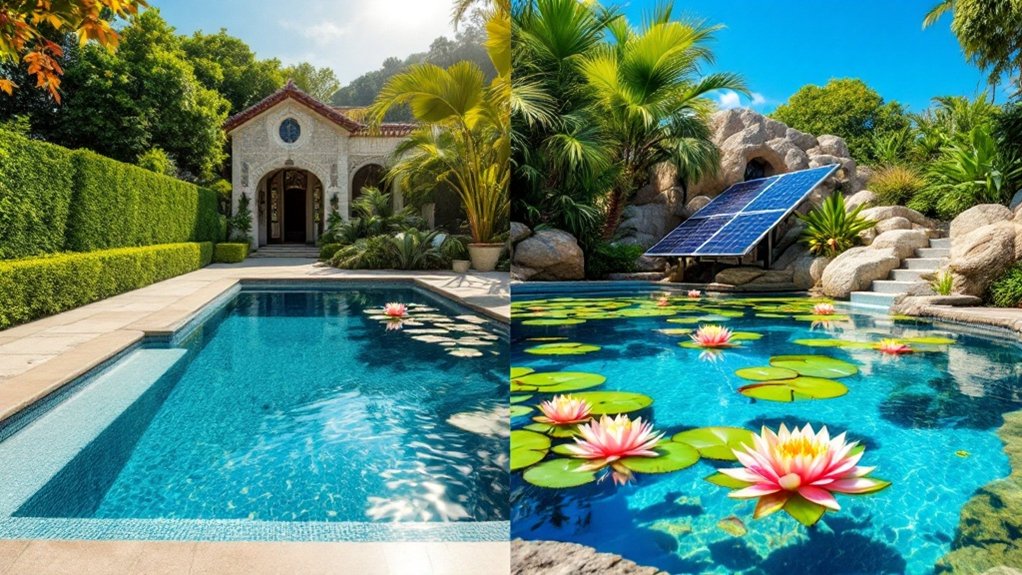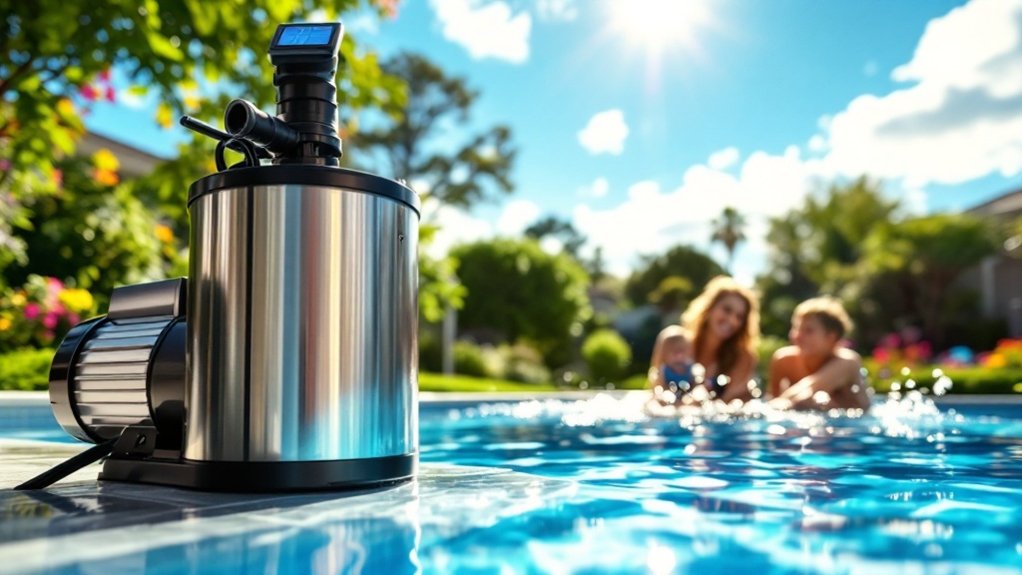Energy-efficient pool heating presents a valuable opportunity for pool owners to reduce costs while maintaining comfortable water temperatures. Options such as solar heating systems and heat pumps demonstrate significant long-term savings. Furthermore, these solutions align with sustainable practices. However, understanding the various systems and their efficiencies is essential for maximizing benefits. What are the most effective strategies for optimizing these heating methods and minimizing heat loss? The answers may surprise you.
Understanding Energy-Efficient Pool Heating Options
As homeowners seek to maximize comfort while minimizing energy costs, understanding energy-efficient pool heating options becomes essential. Various heating systems cater to different needs and preferences. Heat pumps, for instance, utilize ambient air to heat water, making them an eco-friendly choice for moderate climates. Gas heaters, on the other hand, offer rapid heating, ideal for quick warm-ups but may incur higher operational costs. Solar pool heating systems harness the sun’s energy, providing a sustainable and cost-effective solution over time. Additionally, electric heaters serve as a convenient option for smaller pools or spas. Evaluating the specific requirements of the pool, including size and location, can help homeowners select the most suitable energy-efficient heating option to reduce overall energy consumption and enhance enjoyment. Moreover, gas pool heaters provide dependable performance, ensuring efficient heating regardless of the outside temperature.
Benefits of Using Solar Pool Heaters
While homeowners increasingly prioritize sustainable solutions, solar pool heaters stand out for their environmental and economic benefits. These systems harness sunlight to warm pool water, considerably reducing reliance on traditional energy sources. By utilizing renewable energy, solar pool heaters lower greenhouse gas emissions, contributing positively to environmental sustainability. Furthermore, they offer substantial savings on utility bills, as operational costs are minimal once installed. The lifespan of solar heaters can exceed 20 years, providing long-term value and reducing the overall cost of pool ownership. Additionally, many regions offer incentives for solar energy adoption, making the initial investment more accessible. Overall, solar pool heaters present a compelling option for eco-conscious homeowners seeking efficient and cost-effective pool heating solutions.
The Advantages of Heat Pumps for Pool Heating
Heat pumps offer significant advantages for pool heating, particularly regarding energy efficiency. By utilizing ambient air to generate heat, they not only reduce energy consumption but also contribute to long-term cost savings. Additionally, their operation results in lower greenhouse gas emissions, making them an environmentally friendly choice for pool owners.
Energy Efficiency Benefits
When considering options for pool heating, one of the most compelling choices arises from the energy efficiency of heat pumps. These devices work by extracting heat from the surrounding air and transferring it to the pool water, resulting in lower energy consumption compared to traditional heating methods. Heat pumps can achieve a coefficient of performance (COP) greater than 5, meaning they produce more heat energy than the electrical energy they consume. This remarkable efficiency not only minimizes environmental impact but also allows for more consistent water temperatures, enhancing user comfort. Additionally, heat pumps operate quietly and can function effectively in various weather conditions, making them a versatile option for pool owners seeking sustainable and efficient heating solutions.
Long-Term Cost Savings
Investing in heat pumps for pool heating brings significant long-term cost savings that can greatly enhance the overall value of pool ownership. Unlike traditional gas or electric heaters, heat pumps utilize ambient air to generate warmth, resulting in lower energy consumption and reduced utility bills. This efficiency translates into substantial savings over time, as heat pumps can operate at a fraction of the cost of conventional heating methods. Additionally, their longevity—often exceeding 15 years with proper maintenance—means fewer replacement costs. As energy prices fluctuate, the stability of heat pump operation can provide consistent financial benefits. Essentially, choosing heat pumps not only promotes cost-effective pool heating but also secures a wise investment for future enjoyment.
Environmental Impact Reduction
A notable advantage of using heat pumps for pool heating is their significant reduction in environmental impact. Unlike traditional gas or electric heaters, heat pumps operate by transferring heat from the air or ground, requiring less energy to maintain desired temperatures. This energy efficiency results in lower greenhouse gas emissions, contributing to a decreased carbon footprint. Additionally, heat pumps often utilize eco-friendly refrigerants, further minimizing their impact on the ozone layer. By relying on renewable energy sources, such as solar or wind, heat pumps can further enhance sustainability. Overall, the adoption of heat pumps not only benefits pool owners through cost savings but also supports broader environmental goals, making it a responsible choice for eco-conscious consumers.
Exploring Gas Pool Heaters: Efficiency and Savings
How can pool owners maximize comfort while minimizing energy costs? One effective solution lies in gas pool heaters, which are known for their efficiency and performance. These heaters utilize natural gas or propane, providing rapid heating capabilities that allow pool owners to enjoy their pools more frequently throughout the season. Gas pool heaters generally have a high heating output, enabling them to raise water temperatures quickly, which is particularly beneficial during cooler months. Additionally, modern gas models are designed with improved efficiency ratings, leading to lower operational costs. By investing in a quality gas pool heater, pool owners can achieve a balance between comfort and cost savings while ensuring their swimming experience remains enjoyable and accessible year-round. Regular maintenance of the heater fan motor is essential to ensure optimal performance and energy efficiency.
Tips for Optimizing Your Pool Heating System
To optimize a pool heating system, several key strategies can be employed. Regular maintenance practices guarantee that the equipment operates efficiently, while utilizing solar heating can considerably reduce energy costs. Additionally, optimizing the use of pool covers not only retains heat but also minimizes evaporation, further enhancing energy savings.
Regular Maintenance Practices
Regular maintenance practices play an important role in enhancing a pool heating system, guaranteeing efficient operation and longevity. Routine tasks such as checking and cleaning filters can greatly improve performance, as clogged filters impede water flow and increase energy consumption. Inspecting connections and valves for leaks is essential; even minor leaks can lead to considerable energy loss. In addition, scheduling regular professional inspections helps identify potential issues before they escalate, allowing for timely repairs. Cleaning the heat exchanger is also critical, as buildup can diminish efficiency. Moreover, monitoring the thermostat settings guarantees that the system operates within ideal temperature ranges. Consistent maintenance not only extends the lifespan of the heating system but also contributes to lower energy costs over time.
Utilize Solar Heating
Solar heating presents an eco-friendly solution for enhancing pool heating systems, harnessing the sun’s energy to maintain comfortable water temperatures with minimal environmental impact. By installing solar panels on rooftops or poolside, homeowners can considerably reduce energy costs while extending the swimming season. It is essential to position the solar panels in areas with maximum sunlight exposure and minimal shading to improve efficiency. Additionally, selecting a high-quality solar collector can further advance heat retention and transfer. Regularly cleaning the panels guarantees peak performance, while integrating a solar controller allows for better management of heating cycles. By leveraging solar heating, pool owners not only contribute to sustainability but also enjoy long-term savings on energy bills.
Optimize Cover Usage
While many pool owners focus on heating systems alone, optimizing cover usage can greatly enhance energy efficiency and temperature retention in swimming pools. A well-fitted pool cover minimizes heat loss during the night and reduces evaporation during the day, ultimately lowering heating costs. Using a solar cover can harness sunlight to warm the water while providing insulation when the pool is not in use. Additionally, ensuring the cover is properly maintained and free of debris can improve its effectiveness. Pool owners should adopt the habit of covering the pool whenever it is not in use, especially during cooler months. By prioritizing cover usage, owners can considerably extend their swimming season and enjoy substantial savings on energy bills.
How to Reduce Heat Loss in Your Pool
To maintain a comfortably warm pool, addressing heat loss is essential, especially during cooler months. One effective method is employing a high-quality pool cover, which minimizes evaporation and retains heat when the pool is not in use. Additionally, installing windbreaks, such as fences or shrubs, can shield the pool from cold winds that contribute to heat loss. Regular maintenance of pool equipment also plays a significant role; ensuring that heaters and pumps function efficiently helps prevent heat loss. Moreover, considering the pool’s placement in the yard can mitigate exposure to elements. Finally, using solar heating systems can enhance heat retention while providing an eco-friendly energy source, ultimately reducing the overall heat loss in the pool. Regular service and maintenance checks can further optimize the efficiency of heating systems, thereby reducing energy consumption and costs.
Cost-Benefit Analysis of Energy-Efficient Heating Solutions
Evaluating the cost-effectiveness of energy-efficient heating solutions is essential for pool owners aiming to enhance comfort while managing expenses. Energy-efficient heaters, such as heat pumps or solar heaters, may have higher initial costs compared to traditional options. However, their operational savings can offset these upfront investments over time. An analysis should include factors like installation costs, energy consumption rates, and expected lifespan. While energy-efficient systems typically reduce utility bills considerably, the return on investment varies based on local energy prices and usage patterns. Additionally, potential incentives or rebates can further improve financial viability. Ultimately, a thorough cost-benefit analysis empowers pool owners to make informed decisions that align with both their budget and environmental goals.
Maintenance Tips for Long-Lasting Efficiency
How can pool owners guarantee that their energy-efficient heating systems operate at peak performance? Regular maintenance is key. First, they should routinely check and clean filters, guaranteeing unobstructed water flow. Next, inspecting the heat exchanger for debris or scale buildup will enhance heat transfer efficiency. Additionally, pool owners should verify that all electrical connections are secure and free from corrosion, as faulty wiring can lead to energy loss. It’s also advisable to monitor water chemistry, as imbalanced pH levels can cause damage to heating components. Finally, scheduling professional inspections annually can catch issues early and prolong system life. By following these practices, pool owners can guarantee their heating systems remain efficient and cost-effective over time.
Frequently Asked Questions
How Long Do Energy-Efficient Pool Heaters Typically Last?
Energy-efficient pool heaters generally have a lifespan of 10 to 15 years, depending on factors such as usage, maintenance, and the specific model. Regular servicing can help maximize their longevity and efficiency over time.
Can I Use a Pool Cover With Any Heating System?
Using a pool cover with any heating system is generally beneficial. It helps retain heat, reduces evaporation, and enhances energy efficiency, regardless of the type of heater employed, promoting better overall performance and cost savings.
What Size Pool Heater Do I Need for My Pool?
Determining the appropriate size pool heater involves considering the pool’s volume, desired temperature increase, and heat loss factors. Generally, a heater rated between 50,000 to 100,000 BTUs suits most average-sized residential pools efficiently.
Are There Rebates or Incentives for Installing Energy-Efficient Pool Heaters?
Many homeowners inquire about potential rebates or incentives for installing energy-efficient pool heaters. Various local and federal programs often provide financial incentives, encouraging energy efficiency and reducing overall costs for environmentally conscious individuals considering upgrades.
How Can I Monitor My Pool Heating Costs Effectively?
Monitoring pool heating costs effectively involves tracking energy consumption through smart meters, analyzing utility bills for fluctuations, and utilizing pool management apps that provide insights into usage patterns, helping to identify potential areas for savings.
Conclusion
To sum up, investing in energy-efficient pool heating solutions, such as solar heaters and heat pumps, not only leads to significant cost savings but also promotes sustainability. By optimizing pool heating systems and implementing effective maintenance practices, pool owners can maximize their investment while minimizing environmental impact. With the right approach, enjoying a warm pool becomes both economical and eco-friendly, making energy-efficient options a wise choice for enhancing outdoor relaxation and leisure.




